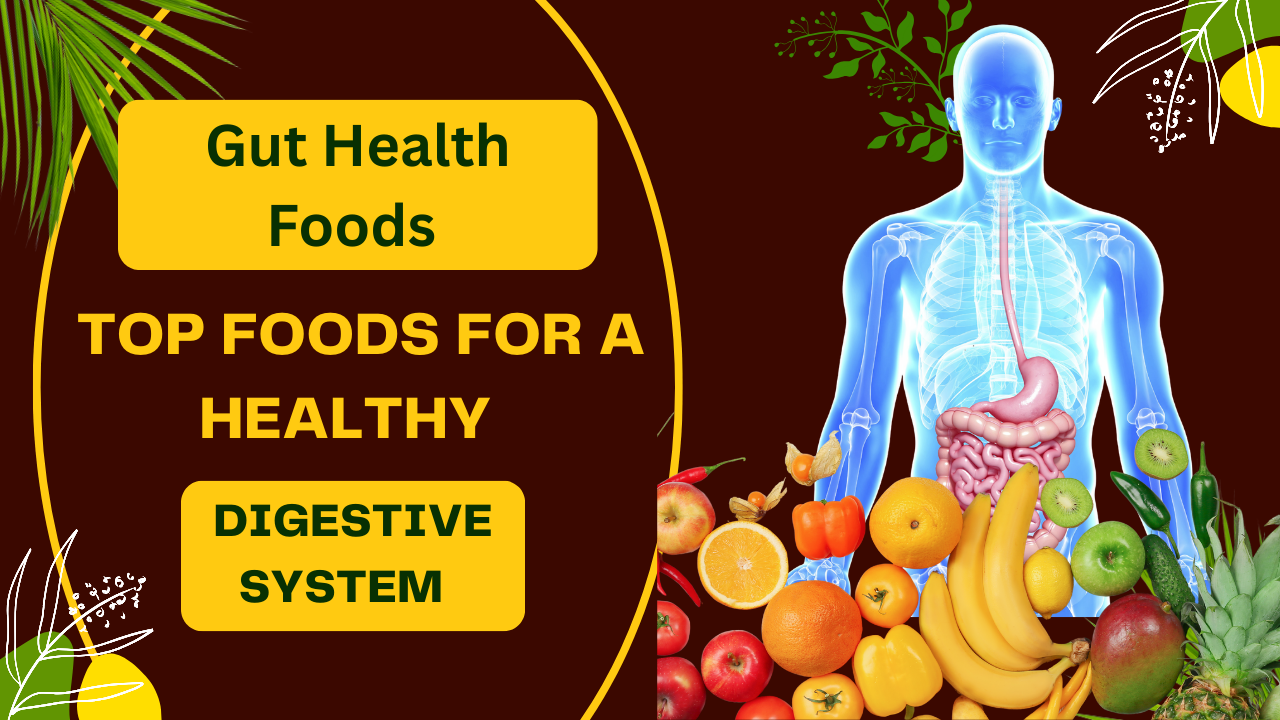In recent years, gut health has emerged as a cornerstone of overall well-being. Once overlooked, the gut is now recognized as a complex system that influences everything from digestion to brain function. A balanced gut microbiome helps regulate inflammation, absorb nutrients, and keep harmful bacteria in check. This shift in understanding has sparked growing interest in foods that support a healthy digestive system.
One of the best ways to promote gut wellness is through your diet. Incorporating gut health foods like yogurt, kefir, kimchi, and sauerkraut introduces beneficial probiotics into your system. These fermented foods help replenish good bacteria, improving digestion and nutrient absorption. Prebiotic-rich options such as garlic, onions, bananas, and oats provide fuel for those beneficial microbes to thrive.
Choosing the right gut health foods not only boosts digestive health but also supports immune function and emotional balance. A nourished gut can mean fewer illnesses, better mood regulation, and more effective weight management.
This comprehensive guide will walk you through everything you need to know about gut health foods, the science behind gut microbiota, and the top 8 food-based strategies to heal and nurture your digestive tract. Whether you’re battling bloating, dealing with digestive issues, or just looking to optimize your overall health, this article has something for you.
What Is Gut Health and Why Does It Matter ?
Your gut, also known as the gastrointestinal (GI) tract, is a remarkable and complex system. It not only digests food and absorbs nutrients but also plays a critical role in eliminating waste. However, recent research has shown that the gut’s influence extends far beyond basic digestion. It has a powerful impact on many other aspects of your health, including your immune system, mood, and metabolism.
At the core of this system lies the gut microbiome—a diverse ecosystem made up of trillions of bacteria, viruses, fungi, and other microorganisms. These tiny organisms help break down food, produce essential vitamins, and protect against harmful pathogens. A balanced gut microbiome is essential for maintaining overall health and preventing inflammation and chronic disease.

Supporting your gut begins with your diet. Incorporating gut health foods such as fermented vegetables, yogurt, kefir, and kombucha can help increase the number of good bacteria in your gut. Fiber-rich foods like beans, bananas, and oats act as prebiotics, feeding these beneficial microbes.
By eating a variety of gut health foods, you can improve digestion, strengthen immunity, and enhance your body’s ability to absorb nutrients and maintain balance.
A Healthy Gut Affects:
Digestion and absorption
Immune system regulation
Mood and brain function (via the gut-brain axis)
Inflammation control
Hormone balance
Weight management
When your gut microbiota is in balance (a state known as eubiosis), you feel energized, clear-minded, and resilient. When it’s out of balance (dysbiosis), you may experience bloating, constipation, fatigue, skin issues, food sensitivities, and even depression or anxiety.
What Are Gut Health Foods ?
Gut health foods are powerful ingredients that go beyond basic nutrition. They play a vital role in feeding the good bacteria in your digestive system, restoring balance to your gut microbiome, and improving your overall well-being. A healthy gut is linked to better immunity, mood, and energy levels, making it essential to choose foods that nourish your digestive tract.
These foods help repair the gut lining, reduce inflammation, and support smooth digestion. When your gut lining is healthy, it acts as a strong barrier, preventing toxins from entering your bloodstream. Gut health foods such as bone broth, ginger, and leafy greens are known to aid in this healing process and reduce digestive discomfort.
Some of the most effective gut-friendly options include probiotics like yogurt and kefir, prebiotics such as garlic and onions, and fiber-rich foods like legumes and whole grains. Fermented foods like kimchi, sauerkraut, and miso add beneficial bacteria to your gut.
Including a variety of gut health foods in your daily meals can enhance nutrient absorption, regulate bowel movements, and create a thriving environment for your microbiome to flourish.
Top Tips: Gut Health Foods to Heal and Nourish Your Digestive System
Load Up on Fermented Foods
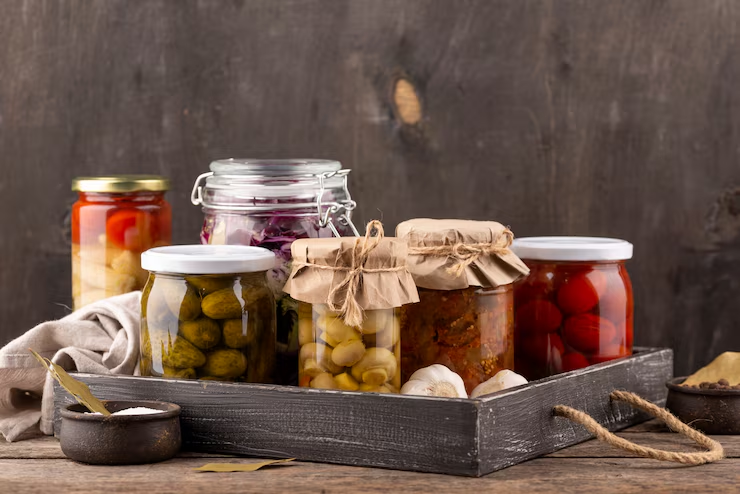
Fermented foods are some of the most powerful gut health foods you can add to your diet. They are rich in probiotics—live beneficial bacteria that naturally support a healthy gut flora. These microorganisms help maintain balance in the gut microbiome, which plays a key role in digestion, immunity, and even mood regulation.
Regularly consuming fermented gut health foods such as yogurt, kefir, kimchi, sauerkraut, miso, and kombucha can significantly increase microbial diversity in your gut. A diverse microbiome is more resilient and better equipped to fight off harmful bacteria and reduce inflammation. These foods also help break down nutrients and support smoother digestion.
Additionally, fermented foods help strengthen the intestinal barrier, which prevents toxins and undigested particles from entering the bloodstream. By incorporating a variety of fermented gut health foods into your daily routine, you can promote overall digestive wellness, enhance nutrient absorption, and support a more balanced and healthy lifestyle.
Examples:
Yogurt (with live active cultures)
Kefir
Kimchi
Miso
Tempeh
Kombucha
How to Use: Include a serving of fermented foods daily. Add kimchi to your salads, enjoy kefir as a smoothie base, or top your meals with a spoonful of sauerkraut.
Eat More Fiber-Rich Plant Foods
Dietary fiber is one of the most essential gut health foods you can include in your daily meals. Unlike other nutrients, fiber isn’t digested in the stomach. Instead, it reaches the colon where it acts as a prebiotic—feeding the beneficial bacteria that live in your gut. This process supports a balanced and thriving microbiome.
As your gut bacteria ferment fiber, they produce short-chain fatty acids (SCFAs) like butyrate, which play a critical role in reducing inflammation and maintaining the integrity of your gut lining. A strong gut lining helps prevent toxins and pathogens from entering the bloodstream, supporting your immune system and overall health.
Excellent fiber-rich gut health foods include fruits, vegetables, legumes, whole grains, and seeds. By eating a diverse range of these foods, you can fuel your good gut bacteria, enhance digestion, and create a healthier internal environment that benefits your entire body.
Best Sources:
Whole grains: oats, quinoa, barley
Legumes: lentils, chickpeas, black beans
Fruits: apples, bananas, berries, pears
Vegetables: broccoli, carrots, Brussels sprouts
Nuts and seeds: flaxseeds, chia seeds, almonds
Pro Tip: Aim for 25–35 grams of fiber per day. Gradually increase intake to avoid bloating.
Include Prebiotic-Rich Foods
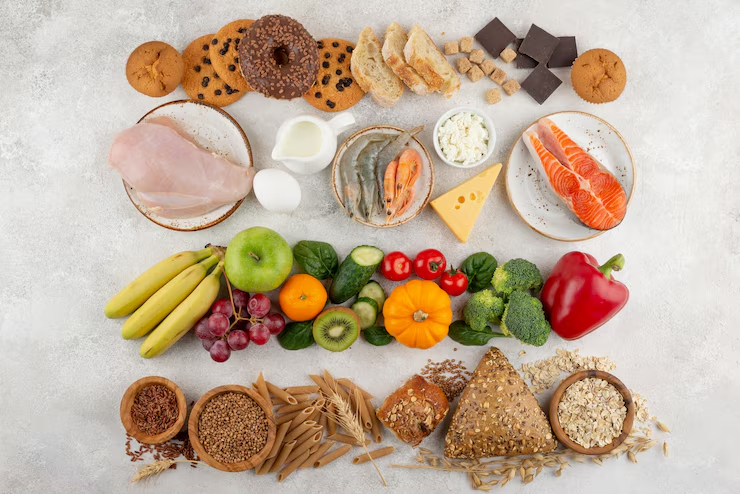
Prebiotics are a special type of non-digestible fiber that play a key role in maintaining a healthy gut. Unlike probiotics, which are live bacteria, prebiotics serve as food for the beneficial microbes already living in your digestive system. Including prebiotic-rich gut health foods in your diet can help strengthen your microbiome from within.
These fibers stimulate the growth and activity of healthy gut bacteria, leading to improved digestion, better immune function, and reduced inflammation. As your gut bacteria ferment prebiotics, they produce short-chain fatty acids, which nourish the gut lining and support overall gut function.
Top prebiotic gut health foods include garlic, onions, leeks, asparagus, bananas, oats, and chicory root. Regularly consuming these foods helps your good bacteria thrive, creating a balanced and resilient digestive system. Incorporating both prebiotics and probiotics into your meals is a powerful way to support long-term gut and overall health.
Top Prebiotic Foods:
Garlic
Onions
Leeks
Asparagus
Bananas (slightly underripe)
Chicory root
Jerusalem artichoke
Easy Add-On: Use garlic and onions in your cooking regularly, or blend bananas into your morning smoothie.
Limit Sugar and Processed Foods
Highly processed foods, refined sugars, and artificial sweeteners can negatively impact your gut microbiome. These ingredients tend to feed harmful bacteria and yeast, disrupting the balance of your gut flora—a condition known as dysbiosis. This imbalance can lead to bloating, inflammation, and a weakened immune response.
When harmful microbes outnumber beneficial ones, it can damage the gut lining and trigger chronic inflammation throughout the body. Over time, this may increase the risk of digestive disorders, fatigue, and even mood imbalances. That’s why avoiding processed foods is just as important as including nourishing gut health foods in your diet.
To support a healthy microbiome, focus on whole, unprocessed gut health foods such as vegetables, fruits, legumes, fermented products, and fiber-rich grains. These foods help restore balance, feed your good bacteria, and reduce the impact of harmful dietary choices. Choosing natural, nutrient-dense options is key to long-term gut health and overall wellness.
Foods to Reduce:
Sodas and sugary drinks
Processed meats
Refined carbs (white bread, pastries)
Packaged snacks with additives
Artificial sweeteners (like aspartame or sucralose)
Better Choices: Choose whole foods, natural sweeteners (like honey or stevia), and limit ultra-processed options.
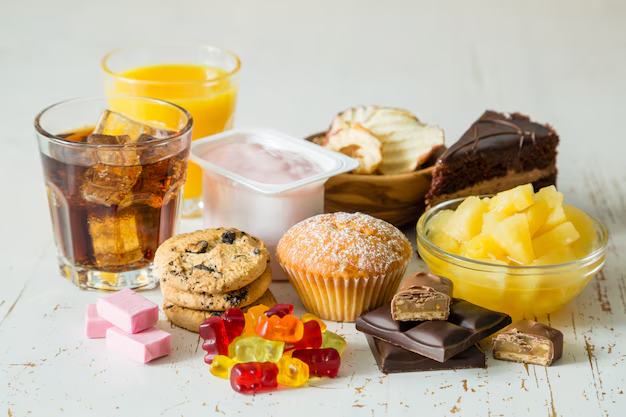
Stay Hydrated
Water plays a crucial role in maintaining a healthy digestive system. It helps break down food, supports the absorption of nutrients, and ensures smooth, regular bowel movements. Without enough water, digestion slows down, leading to constipation and discomfort. A well-hydrated gut is essential for overall digestive efficiency.
In addition to drinking enough fluids, consuming water-rich gut health foods like cucumbers, watermelon, oranges, and leafy greens can further support hydration. These foods not only supply water but also contain fiber, vitamins, and antioxidants that nourish your gut lining and promote microbial balance.
Pairing hydration with a diet rich in gut health foods—including prebiotics, probiotics, and fiber—creates an ideal environment for beneficial bacteria to thrive. Together, water and gut-friendly foods keep your digestive system functioning smoothly, reduce inflammation, and help your body absorb key nutrients more effectively. Staying hydrated is a simple yet powerful step toward better gut health.
Tips:
Drink at least 8 glasses (2 liters) of water per day
Add electrolytes or herbal teas for variety
Eat water-rich foods like cucumber, watermelon, and celery
Bonus: Hydration supports the mucus lining of the intestines, which helps maintain barrier integrity and prevents leaky gut.
Add Bone Broth and Collagen-Rich Foods
Bone broth is one of the most nourishing gut health foods, especially for those dealing with digestive issues like leaky gut syndrome. It’s rich in gelatin and collagen, which help rebuild and strengthen the gut lining, preventing undigested food and toxins from leaking into the bloodstream. This protective effect supports overall gut integrity and health.
In addition to collagen, bone broth provides essential amino acids such as glutamine, glycine, and proline. Glutamine, in particular, plays a key role in repairing the intestinal wall and reducing inflammation. These compounds work together to soothe the digestive tract, ease discomfort, and support long-term gut function.
Including bone broth into your diet regularly, alongside other gut health foods like fermented vegetables, prebiotic fibers, and hydrating fruits, can create a healing environment in the gut. Warm, comforting, and easy to digest, bone broth is a simple yet powerful way to support digestive wellness naturally.
How to Use: Sip on warm bone broth or use it as a base for soups. Add collagen peptides to your morning coffee or smoothie.
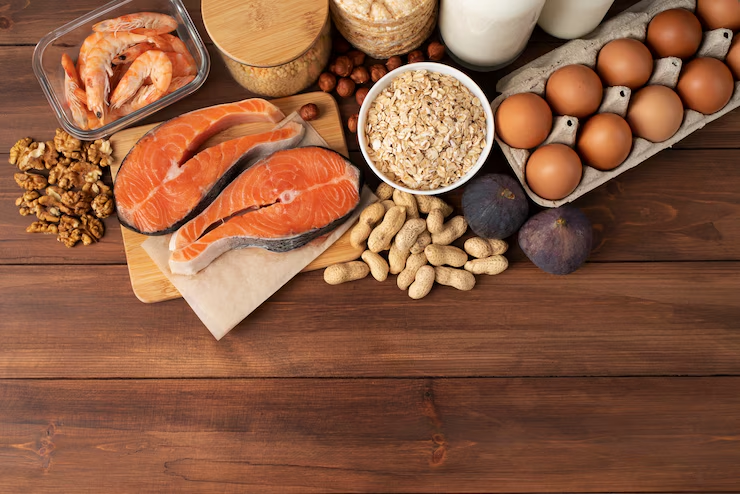
Other Sources of Collagen:
Chicken skin
Fish skin
Egg whites
Reduce Inflammatory Foods
Chronic inflammation in the gut is a hidden trigger behind many digestive issues, including bloating, discomfort, and food sensitivities. When inflammation persists, it can damage the intestinal lining, allowing toxins and harmful bacteria to enter the bloodstream—a condition often referred to as leaky gut. This can weaken the immune system and cause systemic health problems.
One of the first steps to healing is identifying and removing inflammatory triggers such as processed foods, refined sugar, gluten, and excess alcohol. Eliminating these irritants gives your digestive system a chance to reset and begin the healing process. At the same time, it’s essential to replace them with nourishing gut health foods.
Focus on anti-inflammatory gut health foods like leafy greens, turmeric, fatty fish, berries, and olive oil. These whole, nutrient-dense options not only calm inflammation but also support a diverse microbiome and help repair the gut lining—restoring balance and long-term digestive wellness.
Foods to Minimize:
Trans fats
Fried foods
Excess alcohol
Gluten and dairy (if sensitive)
Artificial additives and preservatives
Gut-Safe Alternatives:
Use olive oil instead of vegetable oils
Choose grass-fed or organic meats
Incorporate turmeric, ginger, and omega-3-rich foods
Diversify Your Diet
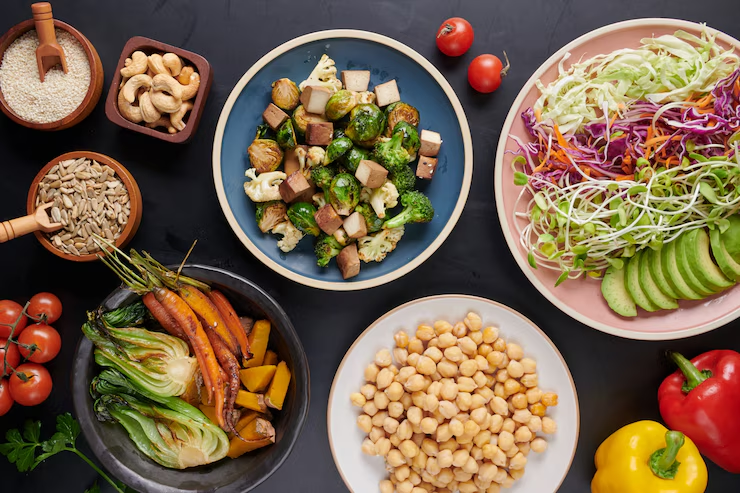
Eating a wide variety of plant-based foods is one of the most effective ways to support your digestive system. These foods are rich in different types of fiber and polyphenols, which act as fuel for various beneficial gut bacteria. The more variety you include, the more types of microbes you can nourish—promoting a healthier, more balanced microbiome.
A diverse microbiome is a resilient microbiome. It’s better equipped to fight off harmful pathogens, reduce inflammation, and support digestion and nutrient absorption. Including a colorful mix of vegetables, fruits, legumes, nuts, seeds, and whole grains ensures you’re feeding the full spectrum of good bacteria with powerful gut health foods.
Many plant-based gut health foods also contain antioxidants and anti-inflammatory compounds that protect the gut lining and support overall health. The key is to eat the rainbow—choosing different textures, colors, and types of plants throughout the week to keep your gut ecosystem thriving.
What to Do:
Aim for 30+ different plant-based foods per week
Try new vegetables, herbs, legumes, fruits
Mix up your grains: swap rice for quinoa or bulgur
Bonus Tip: Use the “rainbow rule”—eat a variety of colors every day to ensure broad nutrient and fiber intake.
Additional Gut-Friendly Lifestyle Tips
Here’s your content formatted in a clear and organized table, focusing on lifestyle habits that support a healthy gut:
| Lifestyle Habit | Why It Matters for Gut Health |
|---|---|
| Sleep (7–9 hours/night) | Poor sleep disrupts gut bacteria balance, affecting digestion, immunity, and mood. |
| Stress Management | Chronic stress alters the gut-brain axis; practices like yoga, meditation, or breathwork help. |
| Exercise | Moderate physical activity (e.g., walking, strength training) increases microbial diversity. |
| Limit Antibiotics | Overuse can wipe out both harmful and beneficial bacteria; use only when medically necessary. |
Including gut health foods in combination with these lifestyle habits can further enhance your gut healing and overall well-being.
Gut-Healing Sample Meal Plan (1-Day)
Here’s your gut-friendly daily meal plan presented in table form with a focus on gut health foods:
| Meal | Menu | Gut Health Benefit |
|---|---|---|
| Breakfast | Greek yogurt with chia seeds, berries, and banana | Probiotics + fiber to support microbiome balance |
| Snack | Apple with almond butter | Fiber and polyphenols to feed beneficial gut bacteria |
| Lunch | Lentil soup with bone broth, garlic, and kale | Prebiotics, collagen, and anti-inflammatory nutrients |
| Snack | Sauerkraut on whole-grain crackers | Fermented food with fiber for probiotics and gut support |
| Dinner | Grilled salmon with quinoa, steamed broccoli, and miso dressing | Omega-3s, fiber, and fermented miso for reducing inflammation |
| Drink | Herbal tea or kombucha | Hydration + probiotics or soothing anti-inflammatory effects |
This daily plan is rich in gut health foods that nourish your microbiome and support digestive wellness.
Conclusion

Your gut is the foundation of your overall health, influencing everything from digestion to immunity and even your mood. When you take care of your gut, it rewards you with better energy, fewer illnesses, and improved mental clarity. A balanced gut supports every system in your body, making it essential to prioritize gut-friendly choices.
Incorporating gut health foods into your daily routine is a powerful way to start. Focus on fermented foods, fiber-rich vegetables and fruits, bone broth, and hydrating options like cucumber or watermelon. These foods help restore balance to your microbiome, reduce inflammation, and improve nutrient absorption—all key to long-term wellness.
Start small and stay consistent. Try adding one or two of the top gut-friendly food strategies shared here. As your diet improves, your microbiome will begin to adapt, grow stronger, and thrive. With each step, your body will respond with better digestion, stronger immunity, and lasting health benefits.
FAQs
Q.1 What are gut health foods, and why are they important?
Gut health foods are nutrient-dense foods that nourish the beneficial bacteria in your digestive system. These include fermented foods like yogurt, kimchi, and sauerkraut, as well as prebiotic-rich foods like garlic, onions, bananas, and oats. They help maintain a healthy gut microbiome, which plays a vital role in digestion, nutrient absorption, immunity, and even mental well-being. Eating a variety of gut-friendly foods can improve overall health and reduce the risk of chronic diseases.
Q.2 How do gut health foods support digestion and reduce bloating ?
Gut health foods help regulate digestion by feeding beneficial gut bacteria, increasing the production of digestive enzymes, and reducing inflammation in the gastrointestinal tract. Foods rich in probiotics and fiber promote smoother bowel movements and better nutrient breakdown. This reduces common issues like gas, bloating, and irregularity, making digestion more comfortable and efficient.
Q.3 What are the best gut health foods to eat daily ?
Some of the best gut health foods to include daily are fermented items like kefir, yogurt, miso, and kimchi, which provide live probiotics. Prebiotic-rich options such as garlic, onions, leeks, and asparagus feed those probiotics. High-fiber foods like lentils, beans, and whole grains support bowel regularity and microbial diversity. Additionally, bone broth, leafy greens, and water-rich fruits like watermelon help heal and hydrate the gut lining.
Q.4 Can gut health foods help with weight management ?
Yes, including gut health foods can support weight management by improving metabolism, regulating appetite hormones, and reducing inflammation. A balanced gut microbiome helps control cravings and blood sugar levels, which are key factors in maintaining a healthy weight. Fiber-rich and fermented foods also promote satiety, reducing the urge to overeat or snack unnecessarily.
Q.5 How long does it take to notice benefits from gut health foods ?
The timeline for seeing results from gut health foods varies by individual. Some people notice improvements in digestion, energy, and mood within a few days, while others may take a few weeks. Consistency is key. A diverse and balanced diet rich in gut-friendly foods, along with proper hydration and healthy lifestyle habits, can lead to lasting improvements in gut health over time.

